A note from the Publisher. Last week I had the opportunity to spend four days observing the Everett Police Department’s 2021 Patrol Tactics and Police Skills Refresher Course. Part of that week of training was an 8-hour block of instruction on Active Bystandership for Law Enforcement. Every commissioned police officer in the city of Everett from the newest recruit to command staff and the Chief will take the ABLE training this year. Here are some photos and observations. LD
Back in September we told you that the police department in Everett, Washington was accepted into the Active Bystandership for Law Enforcement (ABLE) Project. Georgetown University Law Center’s national training and support initiative for U.S. law enforcement agencies committed to building a culture of peer intervention that prevents harm.
Backed by prominent civil rights and law enforcement leaders, the evidence-based, field-tested ABLE Project was developed by Georgetown Law’s Innovative Policing Program in collaboration with global law firm Sheppard Mullin LLP to provide practical active bystandership strategies and tactics to law enforcement officers.
Currently in Washington State the Everett, Auburn and Seattle Police departments have been accepted into the ABLE program. In addition the Washington Criminal Justice Training Commission has met the Academy standards set by ABLE and is teaching ABLE to all new Basic Law Enforcement Academy attendees.
An introduction to ABLE, Law Enforcement Training and Community Safety Act (LETSCA), Critical Lifesaving Skills.
One of the requirements for EPD of participating in ABLE is to help train other police departments.
In addition to officers from the Everett Police Department the class included officers from Mill Creek, Mukilteo, Marysville and Lake Stevens. Experience levels ranged from officers with just two years on the job to master patrol officers, field training officers, sergeants and a police captain with more than two decades of service. The January class included an Everett Police Deputy Chief and Captain of the Investigations Division.
While all new officers coming out of the Criminal Justice Training Academy will receive ABLE, the Patrol Tactics and Police Skills Refresher Course is a reintroduction to what is being taught at the Academy and a chance to reexamine the way experienced officers approach situations.
There are three pillars of ABLE
- Reduce Mistakes
- Prevent Misconduct
- Promote Health and Wellness
ABLE teaches officers that they when they intervene at the earliest possible point in a situation they can keep it from getting to a place where harm is done. Some of the points covered in day one included;
- Active bystandership training is a tool founded upon decades of social science
- It is about preventing harm – to the community, to officers and to the profession
- It requires a culture that supports and expects active bystandership
- It requires the integrity to tell someone what they need to hear instead of what they want to hear
- The courage to say and do things that are hard or scary
- The dependability to always do the right thing and to have others’ best interests at heart
- The ability to have difficult conversations with a colleague, when necessary.
On Monday after the overview of ABLE, the class turned to the Law Enforcement Training and Community Safety Act. (LETSCA) Here’s an explanation from the Criminal Justice Training Commission website.
- Require de-escalation and mental health training for law enforcement.
- Require first aid training for law enforcement and require that they render first aid at the earliest safe opportunity to injured persons at a scene controlled by law enforcement.
- Replace the requirement that “malice” must be proven in order to bring criminal charges to a law enforcement officer, with an objective “good faith standard”.
- Require a completely independent investigation into officer involved uses of deadly force.
- Require notification and involvement of the Governor’s Office of Indian Affairs (GOIA) if a Tribal member is killed or injured in an officer involved use of deadly force.
- Include community stakeholders from diverse groups in rulemaking discussions.
The class then moved into first aid training and how to render aid to anyone injured at a scene whether officer, bystander or suspect.
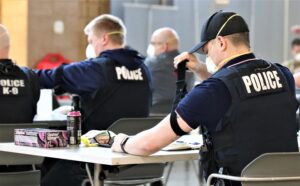
Every member of the Everett Police Patrol Division now carries a tourniquet on duty. Here officers first learn to properly apply a tourniquet.
All patrol officers of the Everett Police Department are issued tourniquets and training included the proper use of that device as well as controlling hemorrhaging and chest wounds. Under LETSCA officers have to render first aid to people that need it, including the suspect/person they used force against, at the earliest safe opportunity.
Communication using the LEED method (Listen and Explain with Equity and Dignity) was also a topic along with using Emotional Intelligence and another review of ABLE bystandership development and officer wellness.
Bystandership started in the airline industry. Think communication in the cockpit. It can also be seen in the operating room. If you are part of the flight crew or operating team you speak out if you see something happening that is creating harm no matter how new you are, whether you’ve worked with the person before. For police it means you intervene in each other’s actions that may create unnecessary harm, regardless of their rank.
Two messages stood out from the day.
- The best person to help an officer is another officer
- Pause, think about what is going on, take action.
Emotional Intelligence, Think Aloud-Talk Aloud, Pause
Over the four days there was an emphasis on things that one doesn’t necessarily associate with police work. One often repeated theme was to pause, assess and then act. Another technique was to check your emotions. Emotional Intelligence was defined as the ability to interpret, understand and manage one’s own and others’ emotions.
One of the ABLE pillars is to promote health and wellness. Meditation and gratitude were suggested as good methods to help and the class was advised to consider four concepts of Emotional Intelligence.
- Relationship Management
- Social Awareness
- Self Management
- Self Awareness
The instructor put it this way, “A new day, that’s where we are folks.”
Think Aloud-Talk Aloud was another technique that was new to many experienced officers. As officers worked on dealing with people experiencing mental health issues one of the training techniques was to talk aloud everything they were doing to those monitoring the exercises. They had to explain “Why you did, what you did, for as long as you did.”
As officers went through the scenarios they were encouraged to communicate, be flexible in changing tactics or switching roles if one person’s method wasn’t working. Communication was key and again a pause to check and assess.
Day 3 consisted of refresher training on vehicle stops, building searches and assessing unexpected situations that change and evolve rapidly. Again communication and the ability to quickly pause and assess were reinforced throughout the day.
Day 4 of the training involved just officers from the Everett Police Department going further in depth on ABLE, the many different levels of intervention and best practices.
One of the discussions centered on how officers help each other no matter what and that should include stopping harmful behavior. One example of the country’s first successful peer intervention programs – “Friends don’t let friends drive drunk.”
Officers who intervene should not face retaliation and those who receive a correction from a fellow officer should accept that.
Everett Police will continue the ABLE training throughout the rest of this year getting the entire department trained including patrol, detectives and command staff on the full 8-hour block. The Department will also conduct annual refresher training above and beyond ABLE.
Following my observations of the training last week I had some follow-up questions for Everett Police.
Q. How did the Everett Police Department decide to become an early adopter of ABLE? Weren’t you already developing a similar culture?
A. Yes, the Everett Police Department already had a culture consistent with the principles of ABLE, but we also have a culture of seeking out and taking part in new and progressive training that reinforces the forward-thinking police practices our community expects. Being among the first agencies to incorporate 40 hours of Crisis Intervention Training (CIT), having officers participate in role-based training scenarios, instituting VIRTRA shoot/no shoot scenarios, emphasizing de-escalation as a tool to minimize use-of-force incidents, and implementing department-wide Implicit Bias training are just a few recent examples of programs we have incorporated into our agency. ABLE is no different. When we saw what was being developed by Georgetown Law and attended a webinar they hosted, we proactively asked to be part of the early rollout of the program. We now have officers who are certified instructors of the ABLE program and other police agencies are asking to participate in the classes.
Q. ABLE is developed nationally but there are regional and cultural differences in each department. Do officers address things differently Everett versus New York, Minneapolis or Seattle?
A. Yes, and no. The ABLE program is a very specific curriculum, created by Georgetown Law. It starts with a core concept of preventing harm to the community and our officers. Each community is different, which means that Everett Police Department instructors are training our employees in ways that resonate with them, and they apply the training in ways that resonate with our community. We assume officers around the country have slight training differences, but the underlying goals within the program are the same: Reduce mistakes, prevent misconduct and promote health and wellness.
Q. What have you learned from the two sessions already offered?
A. Initially officers thought the training was only about intervening when another officer used excessive force or violated policy. They quickly discovered it also included lessons on intervening prior to any force being used – when situations start to escalate. Our officers learned it was about recognizing the emotional triggers that people have and the skills to intervene, at the earliest moment, to deescalate the situation and resolve it for all parties. This helps build relationships and trust with our community and each other.
Everett Police Chief Dan Templeman had this to say about the training.
“ABLE and LETSCA are quickly becoming core tenets of contemporary police training in Washington State. And while it will always be important to teach our officers how to physically defend themselves and the communities we serve, providing police officers with effective de-escalation and peer intervention techniques is also vitally important. I am proud of the work of the Everett Police Department’s Training Unit and the leadership they have shown in not only embracing the changes that our community has called for, but for developing a training program that is a model for other departments across the state and country.”
For those interested, last year Everett Police Chief Dan Templeman issued a statement on the Use Of Force Policy of the Everett Police Department and there is also a list of Frequently Asked Questions on EPD’s Use of Force Policy here on their website.

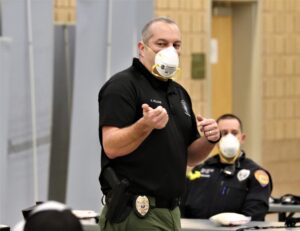
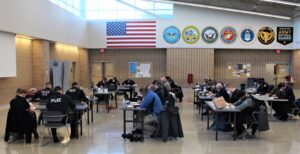
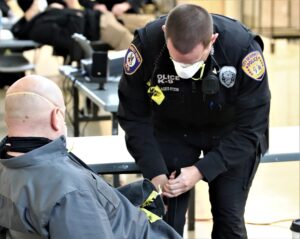
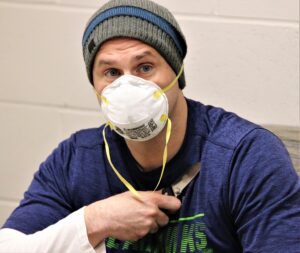
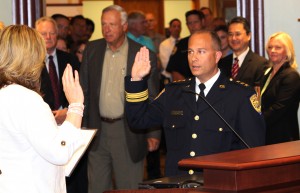



February 10, 2021
Everett, Police Blotter